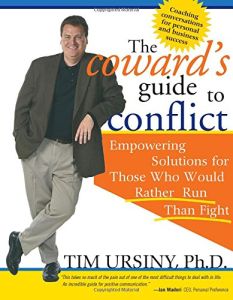Join getAbstract to access the summary!

Join getAbstract to access the summary!
Tim Ursiny
The Coward's Guide to Conflict
Empowering Solutions for Those Who Would Rather Run Than Fight
Sourcebooks, 2003
What's inside?
If you are hiding under the table instead of facing a conflict, come on out and learn how to fight fairly and finally.
Recommendation
This is a fine, short guide to managing conflict. Author Tim Ursiny particularly addresses those of you who are "conflict cowards," people who do not like conflict...and who does, outside of a few well-compensated litigaters? Ursiny himself is a confessed hater of conflict. He has hated it ever since he was a child and now, even though he’s an executive coach and a fairly beefy guy, he still hates it. He is also a psychologist, and his style and approach have much in common with the work of other pop psychology writers, although this guide is more useful than most. Ursiny keeps the reading light by providing ample anecdotes and he invites readers to participate through several self-examination questionnaires. He provides some clearly written, easily accessible explanations of how conflicts occur and how to manage them. In fact, he defines conflict, its consequences and even its benefits so broadly that almost anyone fits the book’s target audience. You got a problem with that? getAbstract.com doesn’t and warmly recommends this entertaining, refreshing book, which - we agree - has something for almost everyone who’d rather duck than fight.
Summary
About the Author
Tim Ursiny is the founder and president of Advantage Coaching & Training and a frequent speaker at corporate events.


















Comment on this summary